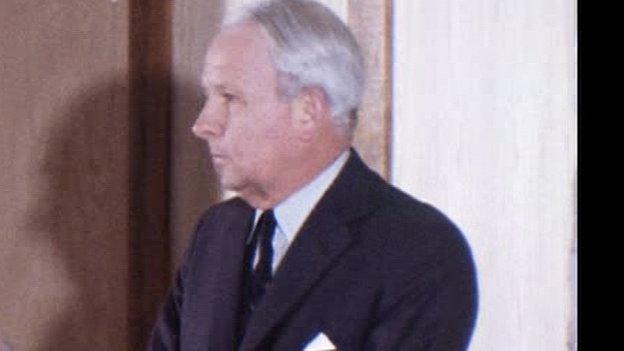Northern Ireland councils prepare for the biggest change in over 40 years
- Published
City Hall in Belfast has been the scene of many debates over the years . as Chris Page reports
Some council functions don't ever change.
In 1955, British Pathé cameras captured one particularly impressive ceremony at which the cities of Belfast and Londonderry jointly awarded freedoms to Winston Churchill.
The proceedings were in some ways very similar to the way the honour would be awarded today - a gala dinner, speeches, and lord mayors in all their regalia.
But otherwise, the local authorities of years gone by worked very differently to those we have known recently.
For most of the last century, councils in Northern Ireland ran most local services.
They had education powers and even ran parts of the NHS.
There were 73 local authorities, which tended to be dominated by unionists.
Consensus grew in the late 1970s that the system was too complicated
The BBC interviewed the then Stormont Prime Minister Brian Faulkner.
In remarks that mirror those of our present politicians, he proclaimed his local government reforms were the most significant in decades.
The number of councils was cut to 26.
Many of their powers were transferred to Stormont.
Councils were left cleaning the streets, emptying the bins, and looking after cemeteries.
But of course politics was going through a much bigger change.
'Dust-ups'
When Stormont was suspended in 1972, the newly redesigned councils became the only forum in Northern Ireland in which politicians debated with each other.
Those debates often turned to dust-ups.
On a search through the archives, I found a report from Magherafelt council in 1985.

Brian Faulkner proclaimed his local government reforms the most significant in decades
Police reinforcements had to be called in after a fight broke out in the chamber, after the SDLP and Sinn Féin voted in an SDLP chair and a republican vice-chair.
One councillor explained it really didn't bother him, as he had been "hospitalised out of the chamber" before, and spent two nights in hospital recovering from the political punch-up.
Unionists were angry that the Sinn Féin vice-chair had raised his fist and said "victory to the IRA". The DUP said they "wouldn't take any threats from skunks like that".
The vice-chair told the BBC reporter he had no apology to make: "I have been elected to represent the republican people."
Back in the capital, journalists nicknamed Belfast City Hall "the dome of delight" - where discussions were rarely dull.
Sit-ins, walk-outs and fisticuffs were far from unusual.
Ulster Unionist Chris McGimpsey was elected in 1993.
"It was very fraught," he says. "There was a joke which did the rounds: 'I went to a fight last night, and halfway through a council meeting broke out.'"
'Escape valve'
But politicians and reporters agree that in spite of all the strains, councils did play a valuable role.
Sunday World northern editor Jim McDowell covered City Hall for many years.
"Beneath all the bluster, there was a sense of civic responsibility here," he says.
"Murders could be condemned, bombings could be condemned. City Hall was an escape valve - and I think that was a good thing."
While high-profile disputes still happen, council politics these days is a comparatively benign affair.
And with the onset of a new type of politics has come new ideas about how councils should be run.
This week, local government is getting some of its powers back.
On Wednesday, 11 new "super-councils" are taking over.
The 26 local authorities will be no more.
They were brought into being at the height of the Troubles, and their politics reflected the fraught times.
But over the course of the councils' existence, Northern Ireland changed profoundly.
Many of the retiring councillors played a role in bringing society into a more peaceful era.
Now it will be down to a new generation of local politicians to take on extra powers - and make the most of the biggest change in local democracy in more than 40 years.